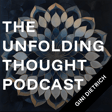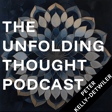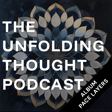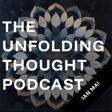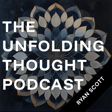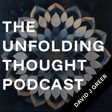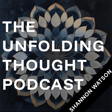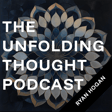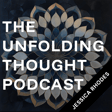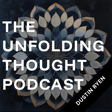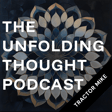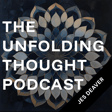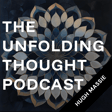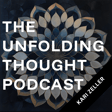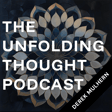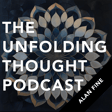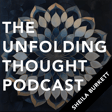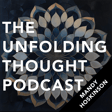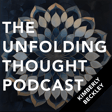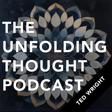Introduction to 'Unfolding Thought'
00:00:04
Speaker
Hi, I'm Eric Kratom. Welcome to the Unfolding Thought Podcast, the show for leaders and deep thinkers who demand more than the usual fluff.
00:00:16
Speaker
If you're the kind of person who moves on from a book, video, or podcast the moment it stops making you think or introducing you to something you can use, I hope you'll feel right at home here.
00:00:30
Speaker
In each episode, we uncover the deeper, often overlooked forces that shape our thoughts and behaviors. So you can see yourself, your team, and the world from a whole new angle, and then actually apply what you learn to grow and do better.
00:00:49
Speaker
On the Unfolding Thought Podcast, we aim for minimal filler, and maximal insight, challenging assumptions and sparking your thinking every step of the way.
00:01:01
Speaker
Are you ready to dive deeper? Then let's get started.
Meet Julie Rush: Educator and Death Doula
00:01:06
Speaker
Today, I'm speaking with Julie Rush, an educator, death doula, and Foresight Activation Lab director at the University of Houston.
00:01:16
Speaker
From guiding students in futurism to walking families through end-of-life transitions, Julie has a unique lens on how we face the unknown. We discuss how strategic foresight connects to emotional intelligence, what it means to die well, and why embracing endings, be it a vision of the future or our very lives, might open up space for more meaningful beginnings.
00:01:42
Speaker
If you're interested in how grief, innovation, and our shared humanity intersect, you'll find this conversation as eye-opening as I did. And now I bring you Julie Rush.
00:01:57
Speaker
Julie, thank you for joining me. Would you mind telling me a little bit about your background? Yeah. Thanks so much for having me, Eric. I have several different weird hats that I have worn over time. One of them is that I work for a school, a K-8 school in Houston, Texas. And so I'm an educator and an administrator.
00:02:16
Speaker
I get to teach kids about foresight and futures. And so it's usually middle school kids. You can imagine 10, 11, 12-year-olds. Thinking about the future. Usually we talk about robots. And then i also ah serve on the adjunct faculty at the University of Houston and in our foresight department and serve on project teams and also help run a lab that we have there.
Role and Insights as a Death Doula
00:02:39
Speaker
And then i also have a training and certification in in being a death doula. And that's something little, I'll say a little bit about that since some folks are not quite as familiar. Same way that you have a birth to doula that helps the mother and the baby of the family giving birth. It's less medical and more of emotional support, making sure the mom has the advocacy that she needs.
00:03:02
Speaker
Those types of things. It's the same in a death situation. And so I will help on the front end with folks getting their wills prepared or you know Death requires so much paperwork.
00:03:13
Speaker
And so I will help folks with all the prep that goes into the dying process. And then during the process, like being with family, helping with some really tough situations sometimes where there may be some family strain or doctors or need some intervention and advocacy there as well.
00:03:31
Speaker
And then I also do grief counseling. And so I help folks on the other end of it. And what I have found in all of that is that talking to people about the future and how the future changes is not so different than the death experience.
00:03:44
Speaker
And so I'm also a mom. And so I wear lots of hats, but those are the professional ones. Thank you. I appreciate that. And you've opened up so many potential avenues that I think would be interesting to go down. But I suppose as a place to start, if we start maybe earlier in life, I wasn't aware that you teach any aspect of foresight or futurism or whichever lens we want to put on it to, I think it was K through eight.
Teaching Strategic Foresight to Young Minds
00:04:20
Speaker
And hopefully at least some people that are listening to this have some familiarity with strategic foresight and the practice of futurism, because I've talked with Jeremy Nulik, who you know as well, but maybe as a little bit of reminder for some people listening to this or anyone that's new, maybe you could explain quickly what that is and then how you're teaching that to children.
00:04:50
Speaker
Sure. yeah Part of what I love about strategic foresight and the futures community is how it scales. A lot of this is is not any different. And we want to be teaching young people how to do some of these complex situations. And so at the university level, we're teaching graduate students who are usually their their professionals in their own right. They're coming to us later in life, midway through life.
00:05:14
Speaker
And in strategic foresight, it's what I usually will say is just futures anticipation. We are teaching people how to be better prepared for the future and how to make good choices. And so we often say it's not predictions. It's usually big research data projects that go into this. And when I do those with the middle school students, it's the exact same thing.
00:05:35
Speaker
So when I teach graduate students how to do a foresight project, it's scanning, it's trend analysis, it's driver analysis, it's scenario writing. It's implications and actions and and what we might implement afterwards.
00:05:49
Speaker
And so the kids do it. They do the future of soccer. They do the future of video games. Sometimes they do some heavier topics. Recently, they did the future of war. And fast fashion was one of the topics. And so usually I let them pick whatever they want.
00:06:03
Speaker
And at the middle school level, they really have some fun with it and are in some ways a lot more creative than the adults. So you mentioned being a death doula. You have a, is it a certification thanatology?
00:06:19
Speaker
Is that right? Yeah, so I did. It's a master's cert. And so I did that degree as well. And it actually so lives in the counseling division. And so it's this kind of mix of like the philosophy, the emotional, social, spiritual, all the pieces that go in, just not the medical.
00:06:38
Speaker
A lot of folks will go get a medical compliment with it. I just decided I'd rather do the psychological, emotional side of of the death work. And i think that that is, it sounds like more related to the grief counseling that I believe you said that you do as well.
00:06:59
Speaker
Right. Yeah. And so if you can imagine like with the design thinking or any of those tools, I do a lot of that at school, like the hopes and fears conversation. And so I'll sit with parents and we'll talk about what's coming up for their child.
00:07:12
Speaker
We'll say, you know, what's your greatest hope for your child? What's your greatest fear? And you can imagine when we do foresight projects, we're asking the same questions. We're asking people like, what's your greatest vision for the future? What's your collapse scenario?
00:07:24
Speaker
And so those things really translate well in education, in conversations about literal death and dying, and then also in futures where we do, you know, if I'm sitting with somebody and we're talking about a collapse scenario, you've got to have some emotional intelligence to sit with someone during that conversation.
00:07:40
Speaker
Okay, so you've talked about this to some extent so far, but I want to make sure that I'm understanding. How is it that this world of strategic foresight or futurism b blends with the grief counseling and being a death doula? Because, of course, on the face of it,
00:08:02
Speaker
Someone would easily think strategic foresight or futurism. It's very forward looking and death doula. You're supporting people at the end of their life. Again, you've talked a bit about it this already, but how do these worlds blend and are there some shared patterns perhaps between the two services or ways of thinking?
Intersections of Foresight and Grief Counseling
00:08:23
Speaker
Yeah, i I don't know that they do, but that's why we're creating something new, right? And so at the University of Houston in the Foresight Department, what we have really tried to focus on is how to help people find themselves in the field.
00:08:38
Speaker
Because we're all competing for the same, you know, whether you're working with clients, you know, we we have a lot of students who come to the program who are pastors. We have folks there that are counselors that are in nonprofits. And it's not just all what most people think of when they think of strategic foresight.
00:08:55
Speaker
And so we try, a lot of us are in education. A lot of us work with kids. You know, we do futures literacy with kids. And Peter Bishop is a great example of that would teach the future, working with young people.
00:09:07
Speaker
And so for me, when I was going through the program myself, I started thinking about these end game conversations and just recognizing that my experience as a death doula really informed how I showed up in those moments.
00:09:21
Speaker
And so now that I'm teaching on the faculty, one of the big parts that we have in the introductory course is the first four sessions are all around self. and self-development and values identification and differentiation and ethics and things like that. Even before we get into any sort of like strategy, we want people to feel like a very solid self.
00:09:45
Speaker
you get into a fun quantum spaces that you start talking about how you know how does a system work how did the parts work things like that but i found myself just starting to apply those pieces of my own personal background actually became a death doula and got into that work because i have a younger sister who died of cancer at 29.
00:10:07
Speaker
And the experience of having to stand still next to that experience while watching, you know, my parents grieving their daughter, my daughter grieving her aunt, all of that happening at the same time was really difficult.
00:10:22
Speaker
And so I decided I wanted to help people in that same situation. And then translate that forward. COVID happens and I'm in the program and at the grad program at the University of Houston. And so many people are having their worlds rocked by COVID and the grief of just not even being able to be with family or the grief of a business closing startup business, you know, things like that. They all live themselves to so much grief.
00:10:51
Speaker
So I think that leads perfectly into one of the things that I was curious about. You have a project that you've worked on called When the Future Dies, if I recall correctly, and I can imagine a lot of different ways to describe that, but does a scenario like what you just described, let's say my business is closed or as a result of the pandemic, a market crash or any number of other things, my hopes and dreams seem to have been lost or changed.
00:11:29
Speaker
Does that relate to when the future dies? And of course, what is that project? Sure. Yeah. Yeah. We'll start with what the project is Part of what I started to discover in these conversations working with other students, working as I began working on project teams for the University of Houston, was when we would have exactly like what you're describing. Sometimes it's change management. There's a reorganization.
00:11:55
Speaker
Sometimes there's a retirement or job loss or there's a Recently, we did a project on the future of ai and just talking about technological grief of how rapid people are experiencing this. Now, when you work in foresight, you see a long game, right? We've seen AI for the past several decades.
00:12:14
Speaker
But for folks who are experiencing it in the room, that feels that occurs very differently. And so what I started to do was gather people who are like-minded and you know, you start getting into other topics like trauma-informed care and trauma-informed futuring of when we speak to people about the future, how do we not re-traumatize them after past events?
00:12:35
Speaker
Now that gets into neuroscience and that gets into biology and that gets into psychology and Gets into lots of places that I realized, Julie Rush can't do all this on her own, so who am I going to partner with in these places?
00:12:47
Speaker
And so When the Future Dies is an umbrella, and then bringing folks alongside who have similar ideas. In the process, I was trying to think of tools to give people. And so created a card deck and do workshops and things like that around that. So that's the When the Future Dies concept.
00:13:05
Speaker
Would love. You have such a great listener audience. So if anybody's interested in that space, you know, like we're looking for folks that are like-minded. And then taking that and being able to serve on project teams where if you've been a facilitator or a consultant, half of what you're doing is watching the body language, the psychology of the room.
00:13:25
Speaker
You're watching for temperatures to spike. And in foresight, we often lean into those spaces. We don't lean out. we die We say, this is this is the hot button issue and and this is where we need to be spending time. And so really being able to identify what is real anger, what is real grief,
00:13:43
Speaker
The Feature of AI project is a great one where folks were heightened. And so being able to know is this technological grief, is this frustration at systems, being able to parse those pieces out has been really helpful.
00:13:55
Speaker
And someone that's interested or for someone that it sounds, is this is, they're curious, they can find this particular project at whenthefuturedies.com, correct?
00:14:07
Speaker
Yeah. Correct. Yeah. Now, is maybe related to that is foresight in activity or a practice that someone might be able to use to help them deal with grief over loss of, like I said, someone's career or something of that nature?
00:14:28
Speaker
Absolutely. I think when we get into positive scenario visioning and looking at aspirational futures, transformational futures, I think a lot of that gives people the type of grounding and hope that is needed to move forward. And there's there's a couple of different frameworks in the field where folks really go from the cognitive to the emotional to the existential environment.
00:14:52
Speaker
And then into action and into some positive visioning and this like this this journey that you have to go on sometimes when you're doing some of this change that we're speaking of. And the type of of strategic foresight that we do is a real long game.
00:15:07
Speaker
It's a slow burn and it's a long game. And so it's not something that will occur over the next three to five years. You know, usually our our time horizons are much further. And so you're asking people to pace themselves and to really dig in and do a lot of work. And so I think what what I have found is that this type of work does really lend itself to the to the emotional side of change and transformation.
00:15:30
Speaker
And i will usually say, here in the West, especially, we will often think about the future and do lots of cognitive processing of data. ah There's a woman, Danella Meadows, who her her places of intervention and leverages for change, you know, she really says, we start with data and we move to paradigm shifts.
00:15:48
Speaker
And there's a lot of work in in the between around systems and around power and goals. But really what we're trying to get people to is those those bottom paradigm shifts and mindset shifts and to get past some hard things that happen in life. Sometimes you need that. You need a complete ah complete overhaul. And strategic foresight, I think, really gives those steps in a really beautiful way of how to really do lots of data analysis, pulling all the information in.
00:16:19
Speaker
What do I want for my life? And so a lot of folks have started to get into personal futures. And I think this straddles both of those areas, personal futures, personal foresight, and then also the strategy of doing it in systems.
00:16:31
Speaker
What kinds of people did you say or what kinds of backgrounds do people tend to have that come to the foresight program at the University of Houston?
Diverse Perspectives in Foresight Education
00:16:42
Speaker
i mean, part of the beautiful thing about being in this field is that there it's you know global, right? And the University of Houston program specifically is virtual. And so it allows folks from all over the world.
00:16:54
Speaker
And so even just this morning was having a chat with someone who didn't go through the program, but is living in Nairobi. And his name is Stephen Litchie, and he's working on with African communities and trauma-informed spaces. And so he's using these same skills and these same tools and methods in a very different context than I find in the urban environment of Houston, Texas.
00:17:18
Speaker
At the University of Houston, the folks who come have continued to change. We've seen a real shift after COVID of the folks who are interested in this work. And as I mentioned, just in our in our cohort, this past fall cohort, there were two pastors who were in a room.
00:17:35
Speaker
And they the way this looks, although the church is certainly a business, the way that this looks for them is really doing the personal development of of the skills and tools that Foresight teaches.
00:17:46
Speaker
A lot of the folks who come, you know, you have designers that come that have have real strong design backgrounds. We have folks who in education, such as myself, coaches, folks that that are in a business area where they're just trying to enhance. You know, we've got folks that work for big companies, Disney, with several gals from Disney that work in their trend analysis and things in our last semester.
00:18:09
Speaker
So it's folks from everywhere. And part of what we think makes Foresight a great business tool is because you don't do it alone. You often will partner with people when you're looking at implications.
00:18:22
Speaker
My situatedness of where I sit does only lends itself to one perspective. And so being a global program and doing foresight globally with others outside of the UH program really brings such a healthy perspective and a lot of diversity.
00:18:39
Speaker
At University of Houston, do you tend to have different motivations amongst your students or even different backgrounds that they come from, depending on whether or not they're getting a degree or a certification? Because you offer both, correct?
00:18:58
Speaker
Yeah, we have a boot camp where you can come to Houston for a week and come hang out with us. And it's a it's a haul. It's a grind, but it's a lot of fun at the same time.
00:19:08
Speaker
We also offer a master certificate that's just the four courses. And then we offer the full masters. And so you have several different options of how you want to engage. And so we'll have some folks who will come and just do a week at a time, do the week at time.
00:19:22
Speaker
certificates And then we have folks said that are trying to do the full. And depending on what you're looking for, a lot of people will come and do the one week. Have so much fun and love it.
00:19:33
Speaker
And then they sign up for the master's program because they get a taste of it. and And that's how we should all do that, right? See if this is worth it for you, if it makes sense to you, if you if it seems beneficial, and then have a deeper level of investment.
00:19:45
Speaker
The same is true if folks come and do the four-course certificate. They will usually amp up and do the full master's. And myself included, if I could do it all over again, i absolutely would.
00:19:56
Speaker
And I just don't know that there's many graduate degree programs that you can say that about where, you know, take my money. I want to do it again. You know, it's just such a great, inspiring, fun time to have with this community of people.
00:20:10
Speaker
You mentioned that designers will sometimes come through your program. And at least with my exposure to foresight, I've seen that designers are often very interested in you know novelty or design thinking or innovation, let's say. And maybe I shouldn't even say often.
00:20:39
Speaker
There is perhaps just a higher percentage of people in the design community or in the maker space that are drawn to broader, you know more open, novel, abstract thinking.
00:20:57
Speaker
And I'm wondering, are there people that you have come through the program or even people that you know that haven't gone through the program that you think this is not necessarily the kind of person that a counselor would say, oh you should go and get a foresight certificate because this is totally you.
00:21:22
Speaker
But perhaps because you get exposed to a lot of people or you just understand this space in a manner that is likely more nuanced than many people.
00:21:35
Speaker
You're able to look at someone that wouldn't have normally been recommended to study this and think, I'm really happy that this type of person is getting this exposure or is interested because we have a richer world of foresight practitioners when it's not just people who fit the mold of being the creative thinker or something of that nature that comes here.
00:22:01
Speaker
Absolutely. 100%. think I felt that about myself. You know, I was working in education and was working with children and knew I wanted to continue my education, but had no idea what I wanted to do it in. And not so many people say that when they come to Foresight.
00:22:18
Speaker
Like I just stumbled in it. You know, I saw the term futurology or I saw somebody call themselves a futurist. I think that's become more common. You know, the term futurist or the title of futurist is becoming more of our vernacular.
00:22:31
Speaker
But I think at the time when I joined a program that was not quite as abundant. And i think just like what you're saying in the program, we try to offer both ends of the spectrum. There are classes like social change and systems, which are very theoretical and are very sometimes philosophical.
00:22:51
Speaker
and When you speak of social change and why dynamics happen and how we change throughout history, you have a lot of theorists. You do a lot of essay writing. You have a lot of philosophy.
00:23:02
Speaker
And then you've got systems which can feel very nebulous And also very practical and detailed. so you have folks on both ends of the spectrum, some who have real trouble seeing the nuances of feedback loops.
00:23:15
Speaker
And some folks who they really struggle with even the tools of how to do the loops, you know. And we've had some great professors who have taught in our systems. Wendy Schultz is a great example. And she would say things like, just write it on a napkin.
00:23:30
Speaker
If you can't use the tool, just write it on a napkin. And I think that was such great advice. But sometimes the the designers will lend themselves, like you're saying. We have a design features class that we teach at the University of Houston and work with some great folks like Adam Cowart, a recent PhD graduate from Carnegie Mellon's Transition Design Program.
00:23:49
Speaker
And he teaches that design class and does such a great job of giving access to folks. who may feel intimidated by the designer role.
00:24:00
Speaker
And i think this really helps them step into that and recognize that sometimes you're doing social architecture. Sometimes you're, you know, we all work in social systems and you're doing system architecture.
00:24:12
Speaker
And so I think that really helps folks who feel like they don't have access to that space. The same is true with some of our more foundational classes. We use something called Framework Foresight at the University of Houston, and which was developed by Bishop and Hines. And the Framework Foresight is very, very clear, very simple, you know elegantly simple.
00:24:33
Speaker
And there is definitely a part of the brain that really likes that, is attracted to like this step, then this step, then this step. So you have those like philosophical theoretical classes, and then you also have the classes that are more structured.
00:24:46
Speaker
And so we try to offer both of those for different types of folks. I think the example of the pastors that came or folks who are science fiction writers, who they just want to be better science fiction writers.
00:24:58
Speaker
And so you've got folks going to get their MFAs and... I just think what I tell the students is not everybody needs to become a doctor, but everybody should be interested in health.
00:25:09
Speaker
And so some folks find themselves wanting to be the doctor. And that's why they come to our program. They want to help in some area and have a certain level of expertise. But at the end of the day, futures literacy, we want everybody thinking about their future. Even if you don't finish the program, we hope that you come and you find something, some tools that could benefit anyone.
00:25:30
Speaker
I'm curious what someone who is on an executive team of a business, let's just say for the sake of argument, it's a hundred person company and they have a six or eight person executive team.
Benefits of Foresight for Business Leaders
00:25:44
Speaker
They're going to have a CEO, a CFO and so on.
00:25:46
Speaker
What might be a practice or a way of thinking or a position that one of these people could take that would allow them to get some of the benefits of strategic foresight without having to be a foresight practitioner? They can still benefit if they, like said, take a certain position in relation to you the work that they're doing.
00:26:15
Speaker
Absolutely. I think futures literacy works for kids as much as it does adults. You know, there are certain certain skills and tools like scanning, horizon scanning. That's something that we teach and is a great skill for anybody who doesn't want to be surprised, can be looking at. And we we take similar to other models. We use a steep model, which is looking at all of these different areas that we see around social, technological, environment, economic, political.
00:26:40
Speaker
And being able to see how these trends that run at different speeds start interacting with each other. Right. And so if we're doing the horizon scanning, I think that's a skill that any CEO could do just in their own daily life. And now fight folks are finding ways of AI to help with scanning or, you know, they've set up some tools for themselves to be able to do some of that scanning in a more.
00:27:02
Speaker
ah a more focused way. We have found that the monitoring of just monitoring certain areas for those folks who they may not have the time to sit and do the full foresight, like we do the full foresight model, but being able to do the horizon scanning and the monitoring around certain areas.
00:27:19
Speaker
Also being able to hire folks who can do outside, you know, we always, we always debate, is it better to have the internal futurist in residence? Or is it better to have the external consultant come in? And that's true for anybody, right? Like if you have the internal, you've got someone who really understands the system in a really beautiful way.
00:27:38
Speaker
And then the external, you've got folks who can see the things you can't see because your nose is in front of your face. And so we find that both of those can be advantageous. But for folks who are, you know, C-suite or are are in leadership positions, I think that Even just taking some of the initial steps of foresight in their business can just do so such wonders.
00:28:01
Speaker
And that's, I think, even if you don't have the funds, even if you're a nonprofit, you know, small nonprofit and you can't access these types of things, there there are so many really nuggets in strategic foresight that lend themselves to better future visioning.
00:28:16
Speaker
and And we find that even just teaching that one week certificate can set people off on a really, ah really beautiful trend and and towards the future.
00:28:27
Speaker
with your grief counseling, and then also some of the things that you're talking about or talked about with dealing with the loss of a vision of the future, that emotional intelligence and grief processing techniques must be crucial at the very least to the kind of work that you do.
00:28:53
Speaker
But I'm wondering if you feel like having some emotional intelligence and maybe even understanding grief processing techniques can help to make someone a better strategic foresight practitioner?
00:29:08
Speaker
Absolutely. I think that's true for anything, right? Any industry, any job that you have, that emotional intelligence is so key. And I think we're seeing that more and more, you know, folks in in what the trends that we're seeing is that people need a level of resiliency.
00:29:23
Speaker
They need, you know, to use the term anti-fragility. They need a real understanding of systems, the beautiful nature of systems and how to recognize self inside of a system. And we teach that to middle school students, you know, how to have critical conversations, how to debate.
00:29:40
Speaker
Part of what we do in my class is debate technologies. And so they'll debate AI in schools. They'll debate monitoring and surveillance. You know, they'll debate those types of things because I want them to be able to understand both sides of these, ten you know, the the pros and the cons of all of these technological advancements and be able to have just a healthy, critical conversation with folks to listen and how much we can't see that in our, in the present at this moment right now. We are nearly incapable of emotionally regulating ourselves to have hard conversations.
00:30:15
Speaker
And so, yes, absolutely, in strategic foresight, I think holding things loosely and understanding that we do live in a chaotic, some folks would say we're post-normal, we're trans-normal, we are we are so far beyond. I think that being prepared for those disruptions, what I like to do in my specific When the Future Dies work is help people anticipate that.
00:30:39
Speaker
that anything a human touches will end or will change. And if that is true, how do we architect that in the beginning of our ideations, in the beginning of our creation?
00:30:53
Speaker
it's a little bit of a complex idea, but in the West, I think we are not as aware of death in the same way that some Eastern religions and Eastern belief systems culturally are.
00:31:04
Speaker
and so helping folks have a healthy dose of reality around the things we're creating, the futures we're we're creating for ourselves, I think that's part of the work. And then also part of it is stepping back and being able to allow.
00:31:18
Speaker
We can't future-proof. Like, I don't think that's actually, i think folks will use that term, but we can't actually do that. And we can do our best and we can hold it loosely and we can make great choices.
00:31:30
Speaker
ah We can have ah stakeholders that aren't in the room, like the environment. You know, we can we can do better at our systems analysis and stakeholdering. I think all of those lend themselves to some of that emotional intelligence like you're talking about.
00:31:46
Speaker
I don't know that everybody has to become a grief counselor or become really aware of how death processes. But I do think that that emotional intelligence and looking at other parts of the world who do this really well is that wise for any of us.
00:32:02
Speaker
with some of the esoteric practices of strategic foresight, some of the non-traditional rituals that you might have that maybe you would like to no longer b esoteric or non-traditional.
Foresight as Art and Science
00:32:20
Speaker
How do those things fit with the more analytical side of the future's work? And how do they fit with the, or how do they combat perhaps the surface level or incorrect perceptions of what futurism is?
00:32:37
Speaker
Sure. I think, and and everybody's got their own flavor and their own brand of this work, but I think in it Houston, what we're really trying to communicate is that this is both an art and a science.
00:32:51
Speaker
There certainly are some methods and some frameworks, and we've got some really beautiful academic publishing and writing that comes from our community. But there's also the art of facilitation, and there's the the art of of helping someone move that paradigm shift, of helping people be able to move from one place to the next.
00:33:13
Speaker
And that's why I say I think it really takes time. taking people on a journey of thinking and feeling a bit of existential crisis and an urgency. ah Bishop and Hines in their book, Thinking About the Future, they would say, you have to you have to rattle people a little bit when you're talking about the implications of what might be, when you start looking at scenarios. And that's why the collapse scenario, I say the collapse scenario is kind of like if you're familiar with tarot,
00:33:41
Speaker
When you flip the the death card and when you have that collapse scenario, you're looking at all the possible negativities that might come. And when people see that collapse scenario, they recoil.
00:33:52
Speaker
And in the same way that the death card in tarot gets flipped and it's saying, no, no, pay attention here. It doesn't mean everything's about to be horrible. and It's saying you have a choice. You know, you can have some new things really come and and like you're saying, be be born. And so, you know, part of what we what we do is have card games. you know, we gamify some of this experience to get into play and humor and having folks.
00:34:20
Speaker
peter bishop and kelly cornet and some others the association of professional futurists a few years ago they had a conference and they did some features improv of helping people get into some improvisation and there are some folks that do the book theory you comes to mind with their presence in theatre And they have a real idea around how to help facilitate folks through stuckness.
00:34:45
Speaker
And that comes from a very non-Western mentality. i think there are some skills and tools in the peripheral community that we look at and we try to bring in, whether Ken Wilber's integral, you know, his his ideas around how we do some self-analysis,
00:35:03
Speaker
Lots of folks like that that were pulling in those skills and those tools and bringing it into the Foresight community and saying, how might we use some of these design being another one? and Houston, when we do projects, we will sometimes partner them with these design experiences because you want to be able to taste the future, smell the future, have a ah an emotional reaction to the future.
00:35:27
Speaker
And being able to tap in with those designers really helps us understand that experience. I think as far as some of the more esoteric experiences and things like that, getting people to a space in facilitation where we just have to pause, even just pausing for self-regulation, even just pausing to get present to all of this data and research and months and months of strategy building that we've been doing. Sometimes you have to get people emotionally present in the room to all of this big, beautiful stuff that we have for them.
00:36:03
Speaker
So I think I think it's a little bit of all of that about playing and doing art and science together. Something you said reminded me of a quote that I will not get correct, but maybe you know it.
00:36:16
Speaker
And it goes something like any useful vision of the future will seem necessarily absurd. Yeah, must be ridiculous.
00:36:27
Speaker
Yeah, that's Jim Gader. Yeah, from Manoa School in Hawaii. Yeah, I think that is a ah great quote and often and often quote that we will use. Yeah, it must appear ridiculous.
00:36:39
Speaker
And if it doesn't, that's a problem because it's not far enough out. It's not stretchy enough. If you're just handing people what we'd call the baseline, if you're just handing people all of that, there's there's no point in having those conversations.
00:36:55
Speaker
When we work with clients, though, they'll often, when we position, we use for the four archetypes. Ours are baseline, collapse, transformation, new equilibrium. When we give folks these these archetypes, they'll often say, oh, we really like the baseline.
00:37:10
Speaker
Of course you do. That's just a continuation of today, just further down the road. And what we will say is that is the least likely possibility, the completely and impossible, unlikely possibility.
00:37:24
Speaker
plus Because it's the collapse, the transformation, the new equilibrium are so much more possible for where we're headed. And so getting folks to understand that is a shift for sure.
00:37:36
Speaker
but But you have to have that stretchiness. And sometimes we stretch folks differently. We give them lots of options and some we will intentionally place as very stretchy because we want to push them a little bit. And then it helps them kind of find like a middle ground in there where they can land somewhere that feels both safe and stretchy at the same time.
00:37:56
Speaker
And I think putting a scenario out there that does feel stretchy is probably when you need to have ah little bit of goodwill from your most skeptical audience members, because Putting a scenario out there that seems unlikely or somewhat ridiculous makes it too easy to cement in someone's mind that this isn't practical.
00:38:28
Speaker
And yet I think what I hear you saying is when we put something that seems out there, when we put that in front of you, I think you're saying that stretches the person in a good way.
00:38:40
Speaker
Absolutely. and And we will often go into those. That's part of that like psychological framing around this. We will often go in and have an expectation, a healthy expectation that some of those stretcher ideas may get cast out first.
00:38:55
Speaker
We know that's probably going to happen. We're surprised sometimes. you know Sometimes groups will they'll they'll jump on those, but most of the time they'll fall somewhere in the middle of what we're what we're offering or suggesting.
00:39:07
Speaker
I think that when we do that work, We will also, as I mentioned before, if we find there's a reaction, a real strong reaction to something, sometimes we will say, hold on, before we throw that out, let's dig in to what's actually happening here.
00:39:24
Speaker
Are you reacting because of some other players that aren't the room? Are you reacting that way because you have a prior experience? We want to try to understand why some of those scenarios are tossed out first.
00:39:37
Speaker
I think that that when we see that emotional reaction to the future, it's also sometimes a key for us to unlock. And we have done projects for clients where They will come back later and say, you know, that one thing that we were so terrified of happening is exactly where we should have been focusing because that was the thing that ended up happening.
00:39:58
Speaker
And, you know, we look at we've done, you know, projects working with electric vehicles and worked with companies that said never, ever. You know, you work with groups that have done, you know, we're moving away and now doing streaming services. And some of those cable television folks were like, no one will ever move away from this ah product that we have.
00:40:16
Speaker
And now everybody's off. You know, most people are doing streaming services. And so you you anticipate some of these things. You anticipate some negative reactions. We encourage people.
00:40:28
Speaker
our students and our facilitators to lean into those spaces. And just like a good counselor, right? Just like a good counselor would say, tell me more. Tell me a little bit more about why you might be reacting that way and do some investigating and some curiosity.
00:40:43
Speaker
And having the, the, your own resiliency to folks, their dismissiveness or their, their anger, their emotional reaction, part of what we have to build in our, in our students and in our folks that we're educating is that resiliency.
00:40:59
Speaker
In many organizations, in many businesses, certain products, teams, or even whole strategies sometimes outlive their usefulness.
00:41:12
Speaker
And i suspect That there are plenty of times that someone would prefer not to deal with certain visions of the future, certain strategies, certain scenarios that you might put out there to stretch them.
00:41:30
Speaker
because maybe much like many of us thinking about our own lives, we have some reluctance to deal with what the end of life might look like or what dying well might look like.
00:41:46
Speaker
And yet, It seems to me that there are a lot of parallels between how you might help an individual die well, if I can put it like that, and how you might help an organization deal with either a current reality of dying well, product, team, organization could be at any level.
Framework for Navigating Major Life Shifts
00:42:08
Speaker
Or maybe it's not the current reality, how you help them deal with massaging or thinking over a vision where something is dying. And then what can we do, think or plan for?
00:42:22
Speaker
What can we learn as a result of this? Yeah, this is like, that's my place, right? Like this is what gets me super excited is this right here. So I, Adam Cowart that I mentioned that teaches a part of our faculty as well.
00:42:36
Speaker
We have ah the World Futures Review is a journal that's in the Foresight community. And he was asked to do a special edition, ah special issue linking transition design and Foresight. And Foresight,
00:42:48
Speaker
and in This special issue, i have written an article, and of course it starts with when the future dies, but the framework is hospice vigil compost.
00:42:59
Speaker
And what it takes folks through is on a personal level or scale, you know, we scale it up to, you know, a larger system level. When we hospice in the United States, It's usually when we have decided to stop intervening measures in someone's life.
00:43:15
Speaker
We've decided that within you know the next six months or so that this person will likely pass on. And so it's really just making them comfortable. And so the first level of the framework would be where are the things we need to be hospicing?
00:43:27
Speaker
And in there are other folks in not just foresight and futures, but other areas where we're really looking into this idea of hospicing futures and hospicing, like where are the used futures? Where are the things that need to die? Where are we just trying to like replicate old futures?
00:43:43
Speaker
And especially in our social systems and even in our work systems. And so being able to have the honesty and the self-awareness.
00:43:54
Speaker
So organizations that really focus in on where are we really at? Are we really continuing to iterate? Do we really believe in that type of change?
00:44:05
Speaker
That's a hard conversation. Nobody wants to be the guy that says, I think that this product, this this team, this this department, all of these things may need to be cut loose. And we've got to find a way to let that die well.
00:44:19
Speaker
The next is vigil. And in the framework and vigiling is really when we sit bedside and you have to you have to have, again, a level of resiliency and stillness and accepting and feeling the feelings that come after making the hard decision.
00:44:36
Speaker
And so how do we do that in our teaming, in our systems? How do we do some things that feel less business as usual? And really get into the emotional side of change. And I i i so i don't think we do that well organizationally.
00:44:55
Speaker
I think it's often very much cut and dry. You know, this person has been removed. This team, you know, we're seeing it happening right now in the world around us where mass massive layoffs are happening. Massive departments are being cut.
00:45:07
Speaker
That can be hard to do that in an emotional intelligence in a system. And then the last piece of the framework is composting. And it's saying, what are all the pieces that we can that we can use as fodder for this new thing to be born?
00:45:21
Speaker
And so being able to use a framework like that on a personal level, obviously, that I think that's pretty accessible. On a larger system level, I think it can become very difficult if you don't have a healthy ecosystem around you.
00:45:36
Speaker
And so some of the work that we do at the University of Houston is we'll we'll do big, long projects with folks or we'll work with clients. And then we find, actually, you need... We're leaving you more with questions than answers because you've got to be doing some great values analysis. You've got to be doing some great mission analysis.
00:45:56
Speaker
Sometimes it comes it comes out that they need to be looking at their ecosystem. And what we what we really suggest to them is you've got to change your model. You've got to change. So I mentioned the Danella Meadows, like leverages of change. And so sometimes it's those ones in there, the goals of the system, the power of the system.
00:46:13
Speaker
Sometimes we suggest that those are the things that need to shift. But I think using a framework like that of hospice visual compost can take anybody through that process if they're willing to do the work.
00:46:24
Speaker
So if someone is facing a major shift, whether it's personal or professional, what might be their first step in embracing grief or uncertainty or contending with that challenge of letting go of an old future and opening up to The new one that I think I heard you say earlier, there was something about the the future, the vision dying can be an opportunity. I forget how you put it, but what's that first step that someone can take and, as I said, use to embrace the grief and let go, but then open up to the new thing?
00:47:15
Speaker
Yeah, I think when I take this back, and this is the work we do with our students in the initial self classes when they're first starting is saying, what do you really value? Let's be just be really clear about what you value and and being able to identify those pieces.
00:47:33
Speaker
I think when folks are able to create a rhythm and a practice doing some honest evaluation for their own life. I turned 40 this past year.
00:47:46
Speaker
For my 40th birthday, I decided to go to Antarctica and was terrified out of my mind to do a trip like that by myself. And what I really wanted to see was by taking time away from my regular life and having a very radical experience, where might the fragile places show up?
00:48:06
Speaker
And that that was engaging in a practice that I knew would be disruptive, intentionally disruptive. And I've had lots of places, I mentioned the death of my sister, where disruption showed up and I had to react.
00:48:21
Speaker
And so this was a proactive choice of saying, how might I insert disruption? And we do that. you know Lots of organizations do that when you have a fragility analysis or you have you know some SWAT team come in and check out you know how all your processes are working, things like that.
00:48:39
Speaker
i i think embedding ah a ritual, part of this is that we don't have a lot of ritual in in the West, especially in the U.S. I think creating rituals around intentional disruption, both personal and professional, by doing healthy self-evaluation check-ins.
00:48:58
Speaker
You can use the example of like even in a marriage, you know, you should... You know, every once a while, check in and say, are we still doing this? Do we still want to do this? Are we still the same people? Are we still choosing this together?
00:49:09
Speaker
And sometimes the answer might be no. and and And often you have to do some recalibration. And so it's just like getting the doctor's checkup of saying, you know, hey, this is a spot we haven't been paying attention to, but now we need to.
00:49:25
Speaker
I think when we have healthy practices and healthy rituals, we are less afraid of the possibility of of something ending because we have built in some some some rhythm that allows that to occur more naturally.
00:49:43
Speaker
yeah Don't let me draw you into too much social commentary if you desire not to go there. But some of the things that you just said made me wonder about, do you feel that as a result of cultural changes, you know, i think we could say in the United States, but probably in other countries as well, cultural changes around protecting children more,
00:50:11
Speaker
or children, even if they're not protected more, they're certainly spending more time on screens, so they're less likely to be running through the neighborhood. And we could trot out any number of examples.
00:50:24
Speaker
Is it reasonable for me to think that a child being protected or held back from experimenting or being in safe, risky situations might hinder their ability to deal with uncertainty and these stretchy scenarios in the future.
00:50:49
Speaker
Absolutely. We, I mean, obviously I work, I work with kids that are at an age where, you know, we want them to be pushing boundaries. It it is, it is expected. it is natural. it is developmentally appropriate for them to be testing and pushing and you want to create boundaries.
00:51:07
Speaker
The adults, you want to create a system around them that keeps a loose hold, you know, and I think that's most systems, you know, you want to have a loose framework. I think most good leaders, that's what they want. I just want to have this loose hold, let you know that you're safe and you've got some leadership here.
00:51:22
Speaker
And i want you to be doing risks. I want you to be doing, trying new things and being creative and feeling like you have that agency and autonomy. When we speak, I serve on teams that are a lot of that are of the guidance, the administrative guidance of a lot of our students.
00:51:39
Speaker
And what we often say is resiliency is really just having someone go through something hard, right? recognizing they were safe and capable.
00:51:51
Speaker
And then they are capable of going on to the next hard thing. And so what we want is for that stair-stepping to keep going and that the adults in the space, they are capable of having their own self-regulation to say, i don't have to stop you from having this scary thing happen. I don't have to stop you from risking or pushing your boundaries, but I'm really going to be here if you need me.
00:52:20
Speaker
And if you fall hard, I will help you. But part of it is the falling, right? Like a kid learning to walk. And that's true for for any any individual. I think professionally, i have had some great mentors and coaches who have done that for me, who have said, you know, like even the work I'm doing around death and grief, you know, my boss, Andy Hines at the University of Houston,
00:52:42
Speaker
He's like, go, girl, go. you know, let's see what happens. And is it risky? Am i bringing up content that can be scary and a bit provocative? Absolutely.
00:52:52
Speaker
But having somebody near me who says i'm going to cheer lead you and hold a mirror up simultaneously, i think is healthy for all of us. I think for our students that right now we have that dichotomy of like the real...
00:53:05
Speaker
You know, the helicopter parenting and the some of the the scarier pieces is that our kids, like during COVID, you know, that was pretty traumatizing for them. And we normalized it. And the adults in the room showed up and said, we can do this hard thing together.
00:53:21
Speaker
And am I scared? Absolutely. Am I struggling? Sometimes. Can i show up in a way that shows you that I can express all of that and feel all of that and still keep moving forward? Yes.
00:53:35
Speaker
And I think for a lot of our kids, they needed that model. They needed to see that, that that we didn't crumble in the midst of something that for a lot of us was very difficult. Hopefully I'm not misunderstanding or abusing this idea, but in the following the idea of monitoring trends, you know, scanning the recent past for where we think things have been going or how we think things have been going and where they might be going in the future.
00:54:04
Speaker
Do you have any concerns about some of those social or cultural changes around the next generation experimenting or not?
00:54:15
Speaker
And what that might mean for society or the economy or any number of other things?
Evolving Education and Workforce Expectations
00:54:22
Speaker
Sure. Yeah, I'm currently reading. So Andy Hines just put out his book, Imagining After Capitalism.
00:54:29
Speaker
And we're doing a little book launch in a few days. And we're going to that's going to be coming out. And I'm reading that. And Andy's research, you know, really says that we're going We are no longer in alignment with capitalism.
00:54:43
Speaker
Our values have shifted. When you look at, you know, the World Value Survey and other data places that we pull from, we're really seeing these value shifts and those are no longer in alignment. And so what are we going to do about it?
00:54:57
Speaker
And often he'll say a lot of folks have a lot of commentary about that, but not a lot of scenarios for for what might be a possible or preferable scenario future. And I'm reading it because I have 10-year-old.
00:55:09
Speaker
And part of me is wondering what world might she be entering into as an adult? And, you know, Andy and I, when we serve on teams together, facilitation teams, we'll talk about the way education, like upper education, is shifting. And sometimes we talk ourselves out of a job because we see the trends as they're heading in you know, in in education debt and education access and education.
00:55:36
Speaker
especially on a collegiate level, and how nimble we may need to become because the workforce has to be transdisciplinary. You know, it's just not working anymore.
00:55:47
Speaker
And some of the ways that the The current workforce, the just-entering workforce, I have a lot of 20 to 30-year-olds who work for me. And a lot of them help me see the other side of something like the great resignation or something like the workforce that's being very choosy.
00:56:08
Speaker
It pushes up against our ideas of loyalty and of stick-with-it-ness. And yet I'm seeing it from their perspective and see a different side of things. I think that when we as the adults try to be critical of the younger workforce or, you know, my daughter's generation in in current middle school age, I think that sometimes we are seeing ourself in all of that.
00:56:36
Speaker
And when we see how fragile some of these kids are, I look on social media and I see a lot of fragile adults. And I wonder about the examples we are setting for them.
00:56:49
Speaker
And the adults in the room that should be able to handle some of these environmental disasters, that should be able to manage some really large political divides, we're incapable.
00:57:03
Speaker
And we haven't solved it for them. And a lot of them are looking at us and saying, as an elder, we're And as someone who's inheriting what you're giving, i don't know that I want it.
00:57:14
Speaker
And my middle school students will often say, what have you done? What have you left us in the environment? What have you handed us? And i think they're right for asking those questions.
00:57:26
Speaker
And so I do, i do, i am concerned about trends for our kids and especially socially and this the grit that we hope for. And if I'm being honest, I'm concerned for the grit of the adults in the room.
00:57:41
Speaker
So you're the Foresight Activation Lab Director at the University of Houston's Foresight Program. And related to a little bit of what you were just saying, are there unique challenges and maybe even some exciting developments that you're seeing in both the next wave of Foresight Education but also the next wave of foresight students?
00:58:12
Speaker
Absolutely. I think that what we have really tapped into at the University of Houston is community building. I think foresight practitioners are often a lone wolf and almost come with a personality type.
00:58:27
Speaker
They like to be the ones who ask hard questions. They like to push. They like to dig in They think broadly. And sometimes you don't want that guy on your team.
00:58:39
Speaker
You know, you don't. I know sometimes, folks, even with me, Julie, do we have to do this over lunch? Do we have to? And it's just part of the personality when this is what you do all day long is that you really show up that way. It's your way of being in the world.
00:58:54
Speaker
I think we are seeing more than ever the need for community around this space for people to say you're not alone. And also folks who are doing as much feeling as they are thinking around the future.
00:59:09
Speaker
there They're being more carefully considerate. They're listening to more voices. They are choosing to live out of their values and not out of the maybe the old paradigm around business as usual. And you know we're in this to to future proof for our businesses and our bottom line.
00:59:28
Speaker
I think they're really, really aching and being vulnerably honest about there has to be more than the bottom line. So I think of a lot of the students that come to us are saying, I want to be changing our social structures as much as I want to be doing our economic structures.
00:59:43
Speaker
And so we see strategy happening everywhere. And I think that the current student climate is one that is hungry for connection, is hungry for creativity and inspiration.
00:59:58
Speaker
They're pulling from so many different disciplines and being... finding themselves uniquely in this space to say, i don't have to be the cookie cutter, you know, Andy Hines futurist.
01:00:10
Speaker
I can be Julie, who likes death and grief and talking about those things. And so an individuality and a uniqueness that says that's what the world needs.
01:00:21
Speaker
The world really needs you to find what you're passionate about and then partner that with some really beautiful strategy. We've talked a lot about strategic foresight and i wanted to make sure to come back around if we had time to your experience around.
Navigating End-of-Life with a Death Doula
01:00:40
Speaker
You've been a ah death doula for three years now, think you said, and you have your master's certificate in thanatology.
01:00:53
Speaker
You are ah grief counselor. And i think that enough people have at least a simple understanding of what grief counseling is.
01:01:07
Speaker
But what I'm wondering is because a lot of people don't know what a death doula is, even hearing you explain it, they might not really know.
01:01:18
Speaker
When or what type of situation might it actually be helpful or might it be right to call someone in? I don't know if it's for myself, if it's for a loved one, what it is, but how do I know when to call you for death doula services?
01:01:37
Speaker
Yeah. I think the folks that I work with, the network of people that I work with, sometimes it's on the front end of saying, I'm not even, well, I hope, not even close to dying, but I want to get my affairs in order.
01:01:50
Speaker
I want to make sure that i that I've had the card conversations. when When my sister became sick at 29, I mean that was not on the bingo card. Right. None of us had thought and processed through what might need be needed. Even my parents were not quite ready for those conversations.
01:02:05
Speaker
I think part of it is getting an action. And that's that that's awareness that that things will end. yeah We are going to as of today, we are going to die. And so the more forward thinking you can be and pragmatic and practical, you can be about those things.
01:02:22
Speaker
I think sometimes folks will give us a call before things get scary, before things become dire, because it becomes all the more harder, because you're having to also manage the emotional side of things.
01:02:33
Speaker
And so you can imagine right now with social media, how do we do inheritance law around being able to inherit a a very... Well, well-funded social media account.
01:02:46
Speaker
How do I, you know, how do I do some of these intricacies of, of the new world? And so some of it is helping just navigate through some weird stuff like that. The other part is when you get stuck I think reaching out to a grief counselor or reaching out to a death doula to, to say I'm i'm stuck.
01:03:07
Speaker
Either my family is stuck around decision-making. I have, I have a dear friend and her father was in, in an emergency situation, became very ill and was having to navigate in a family system that was not sure what life-sustaining versus life-intervening measures were and what his will really tried to articulate.
01:03:32
Speaker
Sometimes it's that. It's being able to step in. And because you're not a heightened emotional state, Being able to real clear be able to be very clear about what's actually happening.
01:03:43
Speaker
So sometimes it's when you need someone to help make a hard, have a hard conversation. Sometimes it's as our parents are aging or if someone is terminally ill, being able to do legacy and legacy. i i want to leave something here.
01:03:57
Speaker
And that was a hard conversation with my own sister of saying, this is not how we thought this was going to go, but what can make it okay? And for her, she had, you know, a list of things that were like, well, let's do these things. And and that's what made it a good death for her like you mentioned before.
01:04:13
Speaker
And then sometimes it'll be friends who will be concerned of other friends. Like, I think they're just stuck around the death of a parent, around a complicated relationship.
01:04:24
Speaker
And being able to let someone just tell the story enough times because your friends are tired of it, your partner's tired of it. You just need someone outside to just hear the story over and over and over.
01:04:38
Speaker
And sometimes it is a little more complicated and I will refer them to some specialists to say, I think this is, this is a level of grief that you need to talk with someone who, who can handle that specific type of grief.
01:04:52
Speaker
And so there's definitely, there's definitely boundaries for that. But yeah, on the front end, in the middle of the thick of it, on the back end, you know, I think you can, you can utilize someone like that along the way.
01:05:04
Speaker
One of the things that you said resonated with or aligned with something that I've thought through ah good portion of this conversation that has touched on or when we have touched on being a death doula or grief counseling or any of those things, and that is that in the book Being Mortal by Atul Gawande,
01:05:28
Speaker
I can't recall who it is that he speaks with. I think maybe it's hospice doctors or nurses or something like that.
01:05:39
Speaker
And a couple people say that one of the things that almost no one does is consider for themselves or ask their loves loved ones, what would make it worth it to you to go down one path or another?
01:05:58
Speaker
So if there's a surgery that someone can have where maybe they're going to live, but they might be a quadriplegic or something like that.
01:06:10
Speaker
One of the things that they say is that these people have learned that that that person and their family will kind of debate well, what's life going to be like?
01:06:25
Speaker
Or, but won't it be so terrible if mom or dad is a quadriplegic, but we don't want to lose them. But when you ask a question like, well, dad, what would make life worth living?
01:06:40
Speaker
Then you start to get to things that I don't want to stretch too far, but I feel like they come closer to foresight. You know, what do i what is my vision of the future given a certain set of constraints?
01:06:57
Speaker
And a number of the things that you've said have kept that in the back of my head, because when I read that book, I felt like it, it was so obvious, but when I'm in the middle of it, I don't know that I'm going to remember that.
01:07:12
Speaker
yeah Yeah, i think exactly what you're saying. Part of the reason why in our structure UH, we do implications after the scenario. Sometimes you have to play the story out. Play the story out for me, this this possible scenario, of this possible future.
01:07:29
Speaker
And then we'll look at implications and we'll say, what are the implications? You know, when we talk of things like exponential growth or when you look at when you do like systems archetyping, you'll say like that exponential growth sounds fabulous. We should absolutely do that.
01:07:43
Speaker
And then you say, great, who are the winners and who are the losers? What are the implications of those choices that we're making? and And you're exactly right that when we talk about extending life, you know, transhumanism, longevity, you know, all those topics are favorites of future folks.
01:08:01
Speaker
When we speak of those, what are the implications of what we're really saying? And I think part of part of on the death side, an example like with my sister, is that we we train our doctors how to continue to sustain life because sustainability has become a core core value of ours.
01:08:21
Speaker
And part of what my work and my writing is challenging is this idea that sustainability at all costs, and really it's about control.
01:08:32
Speaker
It's about the fact that I cannot. Failure or giving in or letting go equals failure. And I'm unwilling to accept that. And I think that's you know it's part of an American ideal is that.
01:08:44
Speaker
That you never give up. And I think it's our social structures. You know, we have folks that stay in jobs much longer than they ever should. They're miserable. Everyone around them is miserable.
01:08:55
Speaker
We know you're miserable and you you need to go And you need to have a good coach and a good leader that can say that, can and look you in the eye and say, i don't think you're happy. Are you?
01:09:06
Speaker
Do you think so? The same is true in our marriages. The same is true in in many of our social structures where we just can't be honest about it. And it's this ice idea of sustainability.
01:09:19
Speaker
i saw it in the I see it often in the medical field where to admit death means failure. And being able to have that very healthy early on conversation of how far are we willing to let this go? What are the implications of letting this go?
01:09:36
Speaker
Does it mean you don't get to die at home? Does it mean you're going to be a quadriplegic? You know, what are the implications of those choices? And that is absolutely a foresight tenet. I really appreciate you giving us just a little glimpse into not just foresight, but when you get to dealing with grief of some type and, you know, you have...
01:10:01
Speaker
been through it in your experience with your sister, I imagine you've been through it with other people now that are close to you perhaps before, but I'm sure after as well, then you have been able to bring to this podcast something that we, yeah as we were just saying,
01:10:19
Speaker
don't tend to think a lot about, and then we're not really prepared ask the questions or to answer the questions that sometimes become really important.
Engaging with the Houston Foresight Program
01:10:30
Speaker
So I appreciate you exploring that with me here.
01:10:34
Speaker
i suppose, though, before we wrap up, you know, we mentioned when the future dies. You mentioned, i think it was writing an article, and I don't know when that comes out. But if it's out, I can link to the publication or directly to it, depending on how it's available.
01:10:53
Speaker
So are there other things that you would like to share or that I can provide links to point people to before we wrap up? Yeah, absolutely. Well, I would be remiss if I didn't point people towards the Houston Foresight program. Absolutely. And and we have a blog and a lab. we We do an annual conference every year in the spring and invite folks to come and see what this This community is about and we play just as hard as we work.
01:11:22
Speaker
You know, we have a program now has its own tattoo that many of us have gotten. We we have a great time experiencing talking, but also just being human beings together.
01:11:33
Speaker
And so I think if they're interested in Finding a community that you can really be yourself in. I think it's a beautiful time to come and visit us. So the program for sure. I'm doing a talk for South by Southwest, which is a conference that happens in Austin and over spring break every year.
01:11:51
Speaker
And so I'll be posting the ah the video of that talk, which is this idea of putting endings into our beginnings, which is a lot of what we've talked about tonight of how to lead from the end.
01:12:05
Speaker
And so, and how to architect that in our social systems. And so I'll post that on the, yeah on the When the Future Dies website to follow it up of just that talk. But I think if anybody's interested in this type of work, you know, come find us, come be part of the community. And I think you're, you're doing a beautiful job of creating a space where so many different thinkers, you can come together. And so to your audience, you know, thanks for putting this together.
01:12:29
Speaker
Thank you very much, Julie. I really appreciate you joining me. And I hope that everyone has found this conversation valuable. Thank you. Hey, thank you for listening.
01:12:40
Speaker
I hope you got a lot out of today's conversation. If you enjoyed the episode, please take a moment to rate, review, and subscribe. And please share it with someone you know who'd appreciate this kind of information.
01:12:52
Speaker
If you want to bring this kind of thinking to your own business, please check out mine at inboundandagile.com. We specialize in helping leaders with challenges around marketing, communications, and leadership.
01:13:05
Speaker
so they can inspire real action in their people and audiences. Thanks again for listening, and I hope you'll come back for future episodes.

